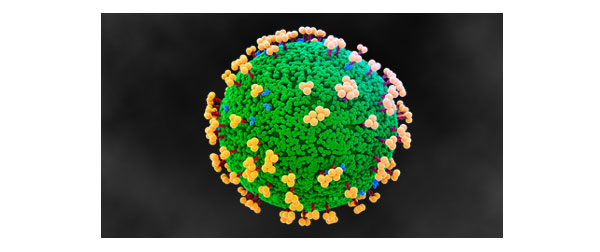The FDA's recent approval of Eli Lilly’s and Regeneron’s therapeutic monoclonal antibodies highlights the utility of neutralizing antibody detection systems.


The emergence of COVID-19, the disease caused by SARS-CoV-2, as a global pandemic has resulted in >60 million infections and >1.4 million deaths worldwide as of 11/30/2020. Studies have shown that SARS-CoV-2 uses an envelope homotrimeric spike glycoprotein to bind to and enter cells, primarily via the human angiotensin-converting enzyme 2 (ACE2) receptor. The receptor-binding domain (RBD) of SARS-CoV-2 spike protein binds with high affinity to ACE2, correlating with the efficient spread of SARS-CoV-2 among humans.
Host antibodies targeting the RBD of SARS-CoV-2 spike protein have been of particular interest as therapeutic agents in the fight against COVID-19. Isolated from the plasma of COVID-19 patients, such neutralizing antibodies (nAbs) have been shown to compete with ACE2 for binding to the viral RBD. nAbs bound to the RBD sterically hinder virus attachment to the ACE2 receptor, thereby preventing infection.
Bamlanivimab is a recombinant, neutralizing human IgG1 monoclonal antibody (mAb) directed against SARS-CoV-2 spike protein that was developed by Eli Lilly and AbCellera. It is designed to block viral attachment and entry into human cells, thus neutralizing the virus, and potentially treating COVID-19. Bamlanivimab was developed by Eli Lilly scientists in under 3 months following its discovery by AbCellera and scientists at the National Institute of Allergy and Infectious Diseases (NIAID) Vaccine Research Center. It was identified from a blood sample taken from one of the first U.S. patients who recovered from COVID-19.
Regeneron's casirivimab and imdevimab, are two monoclonal antibodies (also known as REGN10933 and REGN10987), injected together to prevent cellular infection by blocking the SARS-CoV2 spike protein RBD from binding the human ACE2 receptor. Regeneron scientists tested thousands of candidate antibodies from mice that were genetically modified to have a human immune system, as well as antibodies from humans who had recovered from COVID-19. The two antibodies that were selected bind non-competitively to the spike protein RBD,reducing the ability of mutant viruses to avoid neutralization, while protecting against spike variants that have arisen in the human population, as detailed in a paper published in Science.
To aid in the discovery and development of neutralizing antibodies against SARS-CoV-2, Abeomics has developed a SARS-CoV-2 Neutralizing Antibodies Detection Kit that allows scientists to test for the presence of functional neutralizing antibodies against SARS-CoV-2 present in serum or plasma. It is an easy and fast alternative to the classical neutralization assay using Vero E6 cells. This detection kit is based on a colorimetric reaction, which measures the binding of the RBD of the Spike S protein from SARS-CoV-2 to its human receptor ACE2. The presence of neutralizing / blocking antibodies in the samples are detected by reduction of signal, indicating the inhibition of the Spike-ACE2 binding.
To learn more, please visit: https://www.abeomics.com/sars-cov-2-neutralizing-antibodies-detection-kit.

Abeomics, Inc. is not affiliated with nor endorsed by Eli Lilly and Company and Regeneron













